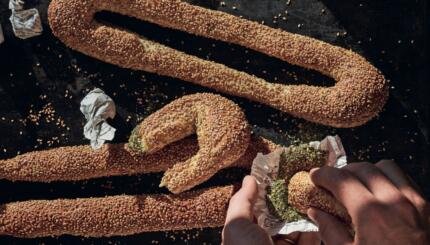After reviewing dozens of brisket recipes, I still can’t believe how many variations of the same dish will grace Jewish families’ dinner tables on Sunday night to celebrate the Jewish New Year.
It was really hard to choose, but we are excited to share with you Maureen Sharon’s Brisket with Tsimmis recipe. Maureen shared that it is her family’ absolute favorite, and perhaps it will become your family’s new favorite too!
We hope you enjoy this special family recipe and enjoy whatever meals you share with loved ones next week. Happy cooking – Happy New Year!
The Nosher celebrates the traditions and recipes that have brought Jews together for centuries. Donate today to keep The Nosher's stories and recipes accessible to all.
Ingredients
1 6 pound brisket
1 Tbsp crushed garlic
1 tsp salt
1 tsp pepper
½ tsp paprika
½ tsp thyme
4 large Onions, sliced into rings
6 stalks celery, sliced
1 lb carrots, sliced (or use whole baby carrots)
12 oz can of tomatoes, stewed or plain
1 cup brewed extra strong coffee
½ cup sweet kosher wine such as Manischewitz
1-2 packages of dried fruit assortment (plums, apricots, etc.)
1-2 lbs small whole yukon gold or red potatoes
2 large yams, cut into chunks
½ cup balsamic vinegar (optional)
½ cup honey (optional)
Directions
Rinse and dry the meat and trim fat to your liking. Rub with crushed garlic, salt and pepper to taste. Preheat oven to 300 degrees.
Cover the bottom of your roasting pan (I often use a large disposable aluminum baking pan) with about 2/3 of the sliced onions, celery, and some of the carrots. Arrange the brisket on top, and scatter remaining onions, celery, carrots and spices/herbs on top. Add half of the dried fruit and all the tomatoes. Pour in the coffee and wine. Cover pan with lid or with heavy duty foil and make sure you have a tight seal.
After 2 ½ hours check for doneness with a fork. If the fork goes in fairly easily, you can remove the meat, let rest for 20 minutes, then slice the brisket against the grain. This is a good dish to make ahead of time. You can either refrigerate overnight or freeze. Store the brisket and sauce/vegetables and fruit (tsimmis) separately. Defrost thoroughly before completing the dish.
Return the sliced brisket to the pan. Add potatoes, yams, the other half of the dried fruit, and more sliced celery and carrots. Recover the pan and cook for at least another hour or two until potatoes are tender.
The vegetables and fruit can be served separately as a tsimmis side dish. You can keep the brisket in a low oven (200° F) for several hours to keep warm.
If you like sweet/sour flavors, add ½ cup Balsamic vinegar before cooking and ½ cup honey during the final reheating stage. Be sure to taste and adjust seasoning, adding more honey or vinegar to taste.
Rinse and dry the meat and trim as much fat as you like. Rub with garlic salt or crushed
garlic, salt and pepper to taste. Preheat oven to 300° F.
Cover the bottom of your roasting pan (I often use a large disposable aluminum baking
pan) with about 2/3 of the sliced onions, celery, and some of the carrots. Arrange the
brisket on top, and scatter remaining onions, celery, carrots and spices/herbs on top. Add
some of the dried fruit and the tomatoes. Pour in the coffee and wine. Cover pan with lid
or with heavy duty foil. You want a tight seal. After 2 ½ hours check for doneness with
a fork. If the fork goes in fairly easily, you can remove the meat, let rest for 20 minutes,
then slice the brisket against the grain. This is a good dish to make ahead of time. You
can either refrigerate overnight or freeze. Store the brisket and sauce/vegetables and fruit
(tsimmis) separately. Defrost thoroughly before completing the dish.
Return the sliced brisket to the pan. This is the time to add potatoes, yams, the rest of
the dried fruit, and more sliced celery and carrots. Recover the pan and cook for at least
another hour or two until potatoes are tender. The meat is delicious with the sauce. The
vegetables and fruit can be served separately as a wonderful tsimmis. You can keep the
brisket in a low oven (200° F) for hours. Since it’s already sliced, it is easy to serve. It
tastes even better the next day. Enjoy.
If you like sweet/sour flavors, add ½ cup Balsamic vinegar before cooking and ½ cup
honey during the final reheating stage. Be sure to taste and adjust seasoning, adding
more honey or vinegar as desired.


